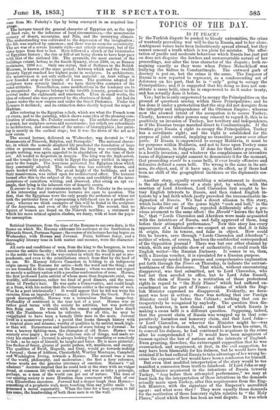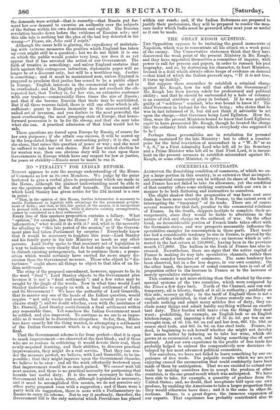TOPICS OF THE DAY.
IS IT PEACE ?
IF the Turkish dispute be pushed to bloody extremities, the crime of wantonly provoking war will be due to Russia, and to her alone. Ambiguous voices have been industriously spread abroad, but they cannot conceal a truth which is too plain for mistake. The affec- tation of pacific and moderate behaviour which Russia has just put on does not disguise the lawless and unwarrantable nature of her proceedings, nor alter the true character of the dispute ; both re- maining exactly as they were when Prince Menschikoff was bullying the Sultan in Constantinople. The outward garb of decency is put on, but the crime is the same. The Emperor of Russia is now reported to represent, as a condescending act of deference. on his part, that he is " only" going to occupy the Principalities ; and it is suggested that his doing so does not con- stitute a casus belli, since he is empowered to do it under treaty, and has actually done it before.
Yes ; but he is only empowered to occupy the Principalities on the ground of questions arising within those Principalities ; and he has done it under a protestation that the step did not derogate from the integrity and independence of the Ottoman Empire ; whereas now the avowed intent of the occupation is to coerce Turkey. Clearly, however other powers may consent to regard it, this is as positively an invasion of Turkey, her territory and independence, as if the Russian troops marched direct to Constantinople. If the treaties give Russia a right to occupy the Principalities, Turkey has a coordinate right ; and the right is established for the purpose of joint control, implying no transitive power over other parts. If Russia is empowered to occupy Moldavia, it must be for purposes within Moldavia, and not to force upon Turkey some act, for instance, in Bulgaria. If done for that latter purpose, it is a hostile invasion; and whatever the complaisance or inventive turns of diplomacy might consent to denominate it for the moment, that proceeding would be a casus belli, if ever treaty offensive and defensive defined a casus belli. The wrong is the same in its ani- mus, its object, and, if it have any, in its effect, as if there had been no shift of the geographical incidence or the diplomatio cos- tume.
Another story, equally resembling a misstatement to deceive, is the alleged disclosure of a state plot, by which, with the sanction of Lord Aberdeen, Lord Clarendon first sought to be- tray English interests to Russia, and then risked English in- terests by a bad faith which justly provoked the irreconeileable in- dignation of Russia. We find a direct allusion to this story, which looks like one of the genus hight "cock and bull," in the Morning Herald of Tuesday, repeated deliberately after a pre- vious averment to the same effect : the Herald "knows the fact to be," that "Lords Clarendon and Aberdeen were made acquainted with the intentions of Russia, and fully approved of them, long before their attempted performance." Now this story has every appearance of a fabrication—we suspect at once that it is false in origin, false in tenon; and false in object. How could this be known, save through ." Lords Clarendon and Aberdeen"; neither of whom, of course, has been the confidential correspondent of the Opposition journal ? There was but one other channel by which, with any probable show of authenticity, it could reach the English writer—the Russian Embassy. It comes to us, then, with a Russian voucher, it is circulated for a Russian purpose.
We scarcely needed the precise and comprehensive explanation put forth through the Times on Thursday, to indicate the untrust- worthiness of this disclosure. That which, without encountering disapproval, was first submitted, not to Lord Clarendon, who had not then acceded to office, but to Lord John Russell, was the claim of Russia to a restitution of those protectoral rights in regard to " the Holy Places" which had suffered en- croachment on the part of France ; claims of which the Eng- lish Minister expressed no disapproval. Evidently, no docu- ment was here in action; there was nothing that our Foreign Minister could lay before the Cabinet ; nothing that can re- trospectively be recognized by anybody. The question then dis- cussed, however, is now closed ; and that of which Russia is making a casus belli is a different question. Supposing, indeed, that the present claim of Russia was wrapped up in that com- paratively harmless and honorary claim, and that Lord John— or Lord Clarendon, or whoever the Minister might be—was dull enough not to discern it, what would have been his crime, if, to conceal his dulness, he had continued to acquiesce in the crime after he comprehended it ? It would have been misprision of treason against the law of nations and the interests of England. Even granting, therefore, the extravagant supposition that he was overreached, and acquiesced, at first, in the evil suggestion, he may have been blameable for his dulness, but he would have been criminal if he had suffered Russia to take advantage of her wrong be- cause the exposure of her would have been a confession for himself.
But even that modified interpretation of the story would be too manifest a concession from truth to falsehood. If Lord John or any other Minister acquiesced in the intentions of Russia towards Turkey, " long before their attempted performance," we may at
i least look for the interpretation of those intentions in the demands
actually made upon Turkey, after this acquiescence from the Eng- lish Minister, with the signature of the Emperor's accredited agent: and what were they ? They were exactly those demands for the restitution of those honorary rights relative to " the Holy Places," about which there has been no real dispute. It was when
the demands were settled—that is recently—that Russia put for- ward her new demand to exercise an authority over the subjects of the Sultan within his own dominions and capital. The Russian revelation breaks down before the evidence of Russian acts ; and this idle tale is nothing but the plea of the bad boy detected in his wrong—" Please, sir, John said I might." Although the cams belli is glaring, the expediency of maintain- ing with extreme measures the position which England has taken up even might still be a question ; but we do not think it is one on which the public would ponder very long, nor does it asyet appear that it has arrested the action of our Government. The faith of treaties is something ; and unless England sustains that faith against this outrageous infraction, diplomatic paper will no longer be at a discount only, but will be a worthless rag. Justice is something ; and it must be maintained now, unless England is prepared to proclaim that justice has ceased to be a public object in Europe. English interests in the commercial way are not to be overlooked; and the English public does not overlook the oft- repeated fact, that Turkey is, for her size, an extensive customer with our traders—commercially three times the size of Russia ; and that if she become Russian that trade may be annihilated. But if all these reasons failed, there is still one other which is all- sufficient : grant to Russia immunity in this unwarranted and naked act of invasion, and you declare to the most powerful, the most overbearing, the most grasping state of Europe, that hence- forward possession is to be for the strong, and that she may take what she can. A practical admission of that kind would not be safe.
These questions are forced upon Europe by Russia, of course for her own purposes ; if she attain any success, it will be scored up in the long-dated ledger of her encroaching policy; it is she, and she alone, that raises this question of peace or war ; and she must be suffered to take her own choice. But if her wicked election be for wanton war, then one obvious duty will be cast upon those Governments in Europe which have any respect for law or justice, for peace or stability—Russia must be made to rue it.



























 Previous page
Previous page